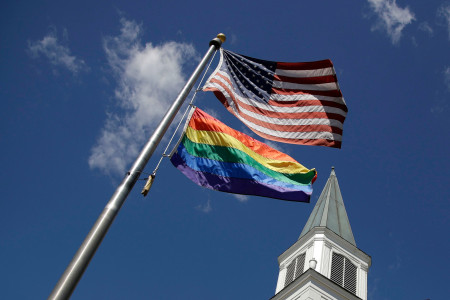Podcast: Play in new window | Download (Duration: 12:35 — 11.6MB)
Two weeks ago, eight advocates and eight bishops, released a proposal that calls for a “amicable separation” of the United Methodist Church.
The proposal prompted a special session of the church’s legislative session last February. The special session, which addressed full inclusion of the LGBTQ community, was left unresolved.
Lisa Schubert Nowling is the lead pastor of the First United Methodist Church in Bloomington. She said the controversy within the United Methodist Church, boils down to how one interprets scripture. Nowling’s interpretation of scripture is that the Methodist church needs to be a place of welcome.
The religious body that makes legislative decisions within the United Methodist Church is called General Conference. In 2016, General Conference put a hold on the two main theological divisions between Methodists who allow inclusion for same-sex couples and Methodists who do not support a full inclusion of the LGBTQ community.
The rift between church hierarchy came after a proposal called the Protocol of Reconciliation and Grace Through Separation was released at a General Assembly Meeting.
The proposal said, “Whereas, The United Methodist Church at its Febrary 2019 Special Session of the General Conference in St. Louis did not resolve their differences specifically related to the full participation of LGBTQ persons in the life of the Church.”
When asked about why other Methodists are not accepting of the LGBTQ community, Nowling said it’s simply a misinterpretation of scripture. She said the United Methodist Church evolved on several other social norms throughout its history: divorce, treatment of women and slavery.
Nowling explained the reason behind the misinterpretation. Given the historical context of Paul the Apostle, first-century norms have evolved exponentially. She said the church needs to read scripture with an understanding of that historical context in which it was written.
Nowling said the United Methodist Church has a negative history pertaining to race relations. In the South, the Methodist Church was split over slave ownership in 1844. According to the United Methodest website, the separation ended in 1939 with a, “Unification Conference establishing the racial segregated Central Jurisdiction as a compromise for those who were willing to exchange their pro-slavery attitude for pro-racial segregation practice.” Nowling said the protocol calls for a recognition of this history.
Nowling said she is hopeful that the resolution pertaining to the LGBTQ community will pass in May. The First United Methodist Church in Bloomington will likely remain in the progressive wing of the Church.
She wanted to clarify that the split is not yet a done-deal. In her view, both national and local media headlines were not entirely correct. Nowling said the decision will come in May 2020 at a General Conference session in Minneapolis.
 WFHB Bloomington Community Radio
WFHB Bloomington Community Radio


